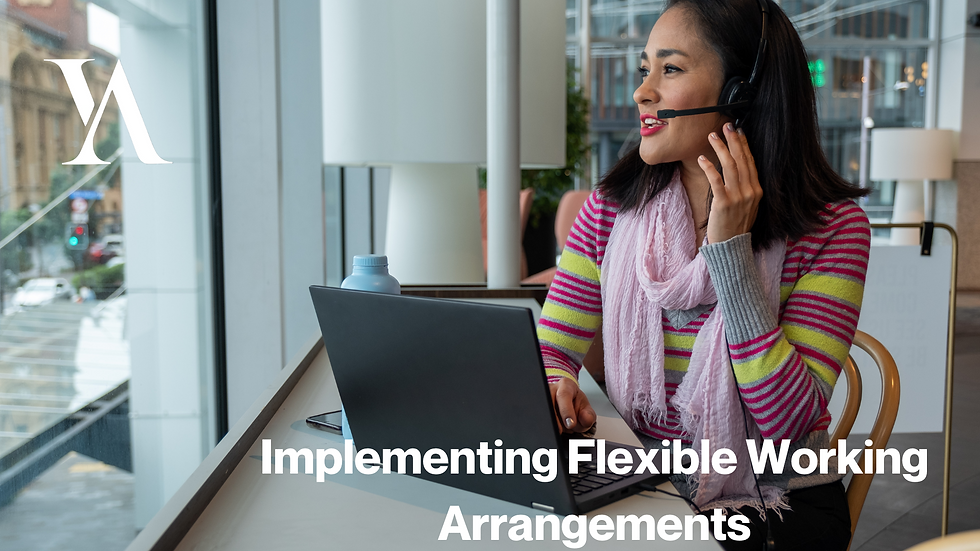Implementing Flexible Work Arrangements
- Sep 16, 2025
- 4 min read

The adoption of flexible work arrangements (FWAs) has become increasingly popular among Malaysian companies, driven by technological advancements and changing workforce expectations. However, implementing such policies requires careful consideration of legal obligations to ensure compliance with Malaysian employment laws. This article provides practical legal tips for companies in Malaysia to successfully implement FWAs while adhering to the relevant legal framework, primarily focusing on the Employment Act 1955.
1. Understanding Flexible Work Arrangements (FWAs)
Flexible work arrangements can include various forms of non-traditional work settings, such as remote working, flexible working hours, job sharing, compressed workweeks, and telecommuting. These arrangements aim to provide employees with a better work-life balance while maintaining productivity.
a. Legal Recognition of FWAs in Malaysia
The concept of FWAs is officially recognised under the Employment Act 1955, which outlines the framework for implementing these arrangements. Notably, the Act includes provisions that guide how employees can apply for FWAs and how employers should respond.
2. Compliance with the Employment Act 1955
a. Section 60P: Application for Flexible Work Arrangements
Section 60P of the Employment Act 1955 allows employees to apply for flexible working arrangements. This section stipulates that employees may submit a written application for FWAs, specifying the changes they are seeking regarding their working hours, days, or place of work.
Tip:
Employers should establish a clear procedure for receiving and reviewing FWA applications. This process should be documented in the company’s employee handbook or policies to ensure transparency and consistency.
b. Section 60Q: Employer’s Obligation to Respond
Under Section 60Q, employers are required to respond to an FWA application within 60 days. The employer's decision must be communicated in writing, and if the application is rejected, the employer must provide valid reasons for the rejection.
Tip:
Employers should carefully document the decision-making process for FWA applications. Reasons for approval or rejection should be based on objective criteria, such as operational requirements or the nature of the job. This documentation is crucial for avoiding potential disputes and demonstrating compliance with the law.
3. Crafting a Flexible Work Policy
Implementing a well-defined flexible work policy is essential for setting expectations and ensuring legal compliance. Here are key elements to include in the policy:
a. Eligibility Criteria
Clearly define which employees are eligible to apply for FWAs. Consider factors such as the employee’s role, job responsibilities, performance history, and the company’s operational needs.
b. Types of FWAs Offered
Specify the types of flexible work options available, such as remote work, flexible hours, part-time work, or compressed workweeks. Outline any conditions or limitations associated with each option.
c. Application and Approval Process
Detail the procedure for applying for FWAs, including how to submit an application, who will review it, and the timeline for a decision. Include provisions for how employees will be notified of the outcome and any conditions attached to the approval.
d. Monitoring and Evaluation
Implement a system to monitor the effectiveness of FWAs and evaluate their impact on productivity, employee satisfaction, and business operations. This may involve regular check-ins, performance reviews, and feedback sessions.
4. Addressing Health and Safety Obligations
Employers must ensure that employees working remotely or under flexible arrangements have a safe and healthy work environment, as stipulated under the Occupational Safety and Health Act 1994.
Tip:
Conduct risk assessments for remote work setups and provide guidelines on ergonomic practices, safety measures, and mental well-being. Employers should also provide necessary equipment and support to ensure a safe working environment.
5. Data Protection and Confidentiality
Flexible work arrangements often involve employees accessing company data from remote locations, which raises concerns about data security and confidentiality.
Tip:
Implement robust data protection policies that comply with the Personal Data Protection Act 2010 (PDPA). Provide training on data security best practices, such as using secure connections, avoiding public Wi-Fi networks, and regularly updating passwords.
6. Amendments to Employment Contracts
If an employee’s FWA request is approved, it may be necessary to amend their employment contract to reflect the new terms and conditions.
Tip:
Include specific clauses in the contract amendment that outline the nature of the flexible arrangement, expectations for performance, communication protocols, and any conditions for reverting to standard work arrangements.
7. Fair Treatment and Non-Discrimination
Ensure that decisions regarding FWAs are made fairly and without discrimination. All employees should have equal access to flexible work options, regardless of their gender, age, or other protected characteristics.
Tip:
Train managers and HR personnel on non-discrimination practices and the importance of providing equal opportunities for all employees to access FWAs.
Conclusion: Implementing FWAs in Compliance with Malaysian Law
Flexible work arrangements can benefit both employers and employees by promoting work-life balance, increasing job satisfaction, and enhancing productivity. However, to successfully implement FWAs, Malaysian companies must navigate the legal landscape carefully, ensuring compliance with the Employment Act 1955 and other relevant laws. By following these legal tips and establishing clear policies, companies can create a flexible, compliant, and supportive work environment that meets the needs of their workforce and business objectives.
For further guidance, consulting legal professionals can help ensure that your FWA policies align with Malaysian employment laws and best practices. Should you have any questions related to the article above, please do not hesitate to contact our managing partner, Eugene Yeong for clarification.



